We live in exciting times, don't we? In the last few weeks, we've seen rockets caught as they land, humanoid robots marched in a demonstration, and AI can now help control your computer.
I wonder if this is what it felt like when we landed on the moon.
Despite all our problems, these sci-fi-becomes-reality advancements give me great hope for the future. It inspires me to think hard about how important good leaders are to navigate these changes, and how I hope we can be a small part of helping more leaders navigate this change well and bring positive change to the world and the workplace.
In today’s edition, we cover a simple, yet powerful phrase, new data from Gallup on AI, and a great question about coaching in Ask Lighthouse.
Let’s dive in…
Table of contents:
- 🥘 Food for Thought on 6 Simple Words that can make a big difference
- 📰 News & Reports for Managers on the real use of AI at work (according to Gallup)
- 🗣️ Ask Lighthouse on Open Door Policies and Solving Problems
- ❓ Poll of the Week on Your Biggest Challenge
➡️ Did a friend forward this to you? Get every issue straight to your inbox by signing up here.
Note: This is a preview of our weekly leadership newsletter, Lighthouse Leadership Weekly (LLW).
To get this sent to your inbox every week, along with our latest long form essays on this blog, you can sign up here.

🥘 Food for Thought
"What did you accomplish this week?" - Elon Musk, serial entrepreneur and founder of SpaceX, Tesla, the Boring Company, and more.
Are you getting done what you need to?
Is your team?
I came across this recent discussion talking about Elon's philosophy on Twitter and it reminded me of one of the fundamental truths that really matter for teams:
Keith Rabois tells the story of Elon Musk observing interns waiting in line for coffee at SpaceX
— Startup Archive (@StartupArchive_) October 19, 2024
Keith is asked how Elon Musk gets so much done, to which he replies:
“If you approach every day and every week of your life with the question, ‘What did you accomplish this week?’ I… pic.twitter.com/zgY5zaahVE
What did YOU and Your Team get done this week?
When you get really busy it can be easy to lose sight of the forest for the trees; all the work your team can get done, all the meetings, and endless chats can make you feel really busy, yet accomplish little.
Or rather, you can check off *lots* of things on your To-do list, only to find the most important things aren't happening. Your projects are stalling. Progress is slow. Deadlines are missed.
This often happens when you lose sight of the most important things for your team to do.
Pebbles, rocks, sand, or water?
I love this quick, simple video (1min 54sec) that illustrates how to think about priorities:
Did you forget a rock?
The question, "What did you accomplish this week?" cuts right through the noise. It forces you to look and think about what you did and what really matters.
We all have those sand and water tasks. Some of them have to get done and eat our time whether we like them or not.
Yet, you have to make sure they don't eat so much of your time you get nothing done that really matters.
And if someone asks you, "What did you accomplish this week?" that will make you step back and realize whether those right things got done or not.

Eat the Frog!
One of my favorite concepts, which participants of the Lighthouse Lesson's program, "The Secret Habits of Senior Leaders" are learning in depth right now is to eat the frog.
As author Brian Tracy explains it:
"Mark Twain once said that if the first thing you do each morning is to eat a live frog, you can go through the day with the satisfaction of knowing that that is probably the worst thing that is going to happen to you all day long.
Your "frog” is your biggest, most important task, the one you are most likely to procrastinate on if you don't do something about it.
You need to "eat the frog" to make sure you like your answer to "What did you accomplish this week?"
Pause and take a look in the mirror
If you're reading this soon after we send it, it's the weekend. A perfect time to quietly reflect for a minute about the week that was and what you have coming up.
So let's take a minute and really think. Answer 3 questions, and put yourself on a better path:
- What did you accomplish last week?
- What didn't get done that you realize needed to?
- What can you do differently next week so that you accomplish the right things?
I bet you'll find at least one thing you'd do differently.
For the Pros: Remember you're a leader. That means your team needs to think that way, too.
Ask them these questions and really listen to especially their ideas for question 3.
You may be surprised how much these simple questions can improve the productivity and accomplishments of your team.
📰 News & Reports for Managers
📌 Gallup's data on AI in the Workplace
The AI era is here. You may not use AI every day yet like I do, but the day is coming. And soon, you'll be using AI and not even know it, because so many tools will have integrated it into the workflows you already have.
As this transition is upon us, I'm always on the lookout for trends, data points, and information that you need to know about.
And as usual, Gallup is there in a way few others can be; they have access to more data and more companies in more places around the world than anyone.
So when I saw that a couple of weeks ago they reported some AI findings, I knew we needed to take a look at them and discuss them.
Here's what you need to know:
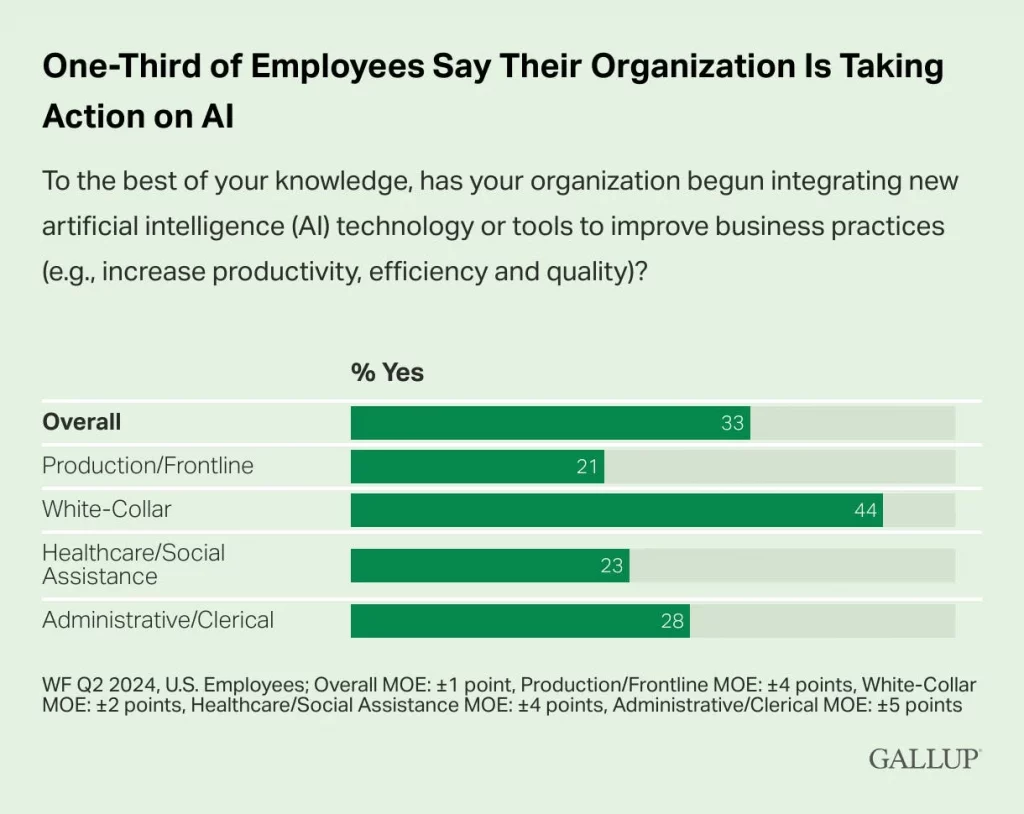
As you can see, it's not quite the majority yet, but in most places, the most forward thinking companies in industries that are near a computer all day are starting to use AI daily.
If you're not, you're not late to the party...yet...but you definitely need to get started.
Now, here's where it gets interesting:
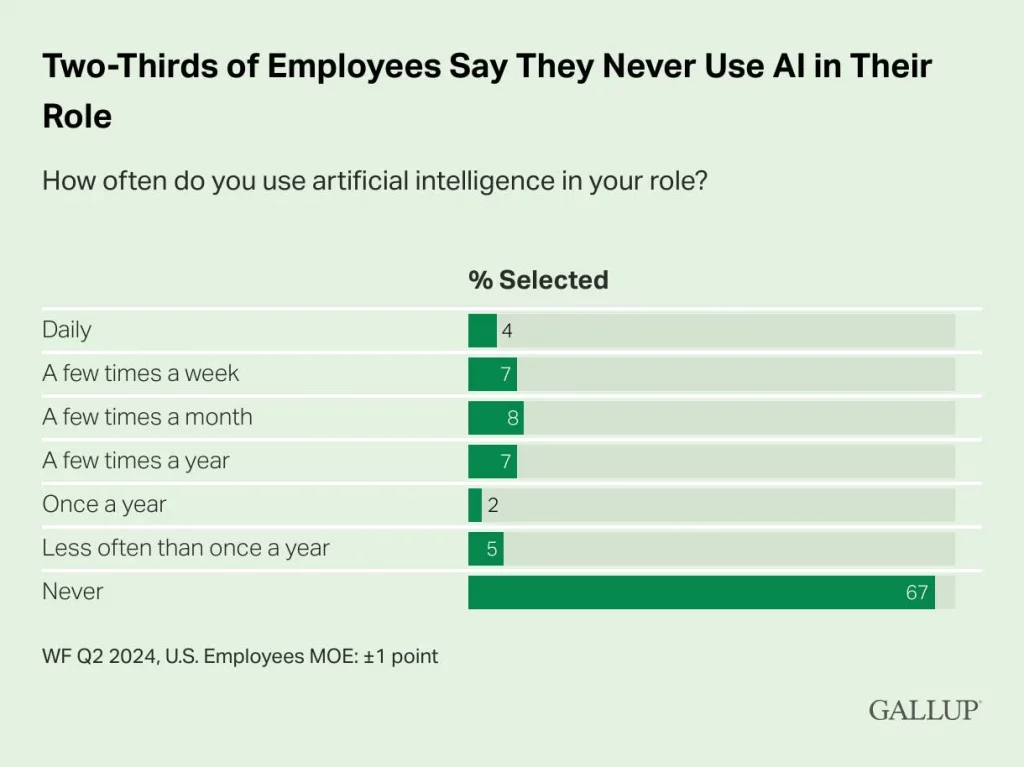
According to Gallup, "These figures remained essentially unchanged from 2023 to 2024."
What that says to me is that the early adopters of AI are continuing to go deeper and deeper, getting more and greater benefits from AI, while most people still haven't really given it a try.
If you're not familiar, this fits the adoption curve quite neatly:
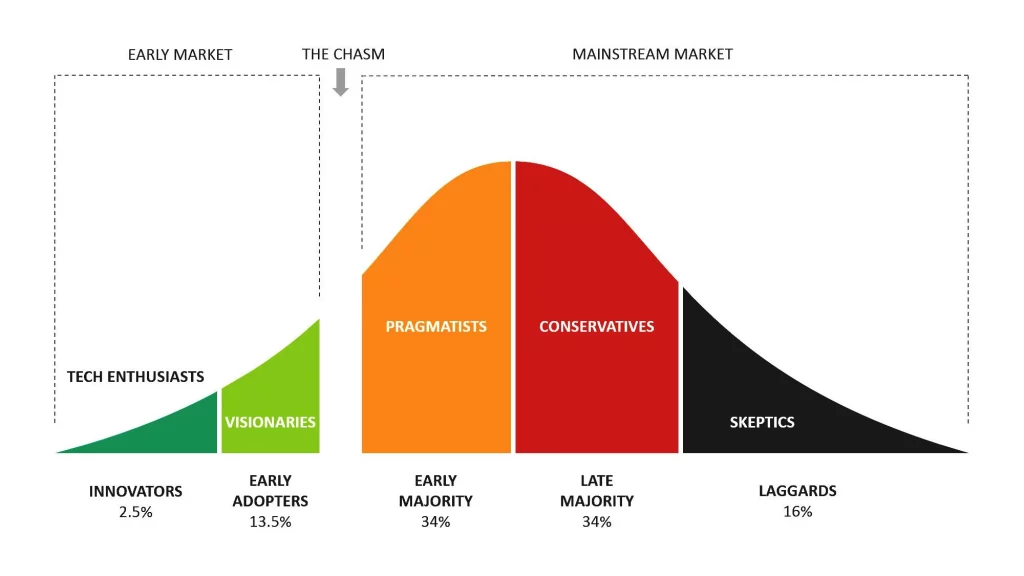
If you look at the numbers Gallup is reporting above, only about 19% are using AI at least a few times a month, which is pretty close to the total of innovators and early adopters pictured above (2.5 + 13.5 = 16%).
That makes sense, because "Innovators" love to try new tools even when they're broken, incomplete, and basic in their abilities. "Early Adopters" then come along and are able to use new technology when it's just barely piecing together helpful functionality and features.
It is only when the products are clear, easy to use, and have obvious applications that the "Pragmatists" come along, and everyone else needs even more proven and explained before they come on board.
So right now AI is right at "the Chasm" in the picture.
Are you and your team ready for it?
Leaders (YOU) can lead the way.
As a leader, you have the ability to help your team and your company adopt and benefit from AI much faster for a few reasons:
- You know what everyone on your team is doing: If someone on your team starts using AI in a clever and productive way, you should study it, then ask yourself, "how can the rest of the team do this, too?"
- It's your job to be a coach! Not everyone understands AI as easily as others. Maybe that one team member has a child who has loved playing with it at home and that's inspired them, or maybe someone has a great side project that sparked new ideas. Whatever the reason, not everyone will "get it" and apply it the same, so it's YOUR JOB to teach those that are a bit behind.
- Your peers are assets, too. As a leader, you're in meetings your team is not. Pay attention (or outright ask!) how your peers and other teams and departments are using AI. You never know when you may find out about another tool, use case, or action you and your team should try out. Take advantage of the higher vantage point you have as a leader.
And if you're not sure where to start, Gallup has some great data on how individual contributors and managers are using AI.
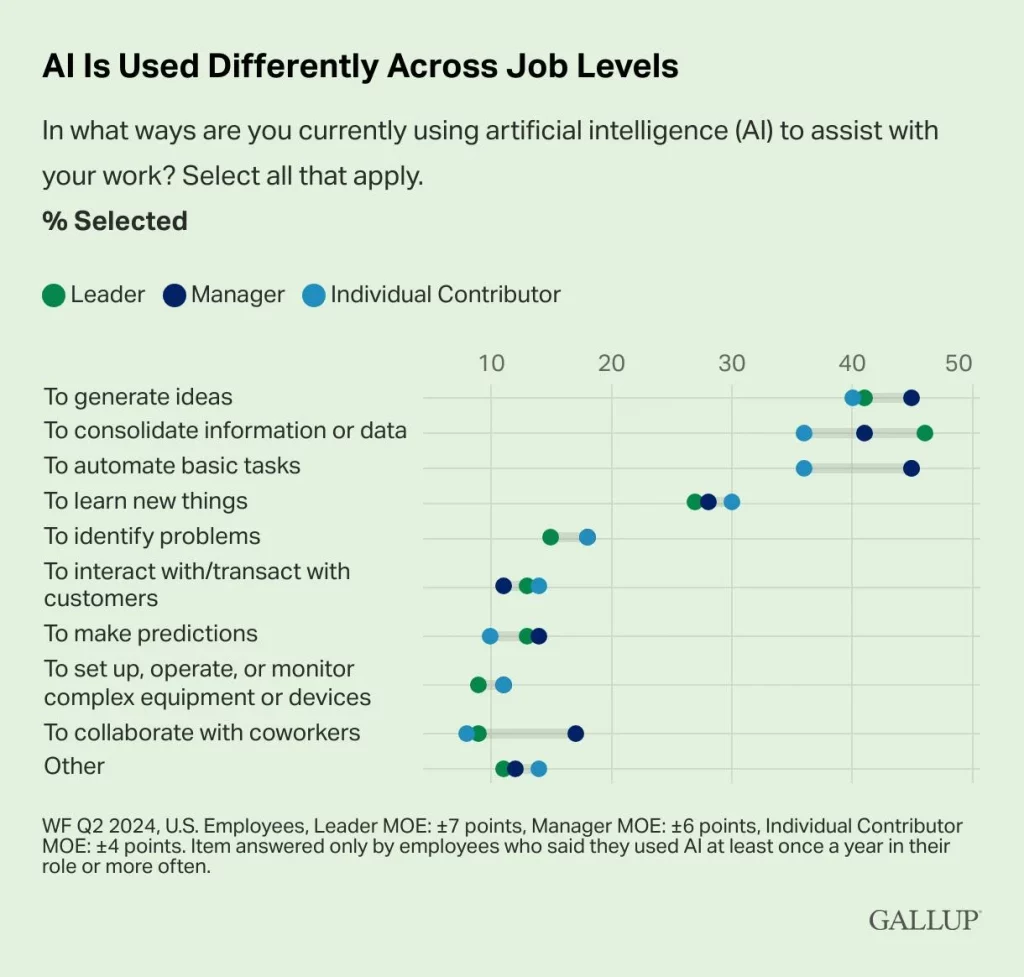
Take this data and use it to start new conversations with your team and peers.
Rather than asking, "How are you using AI?" which can be vague and go in 100 directions, try being more directive and asking great, specific questions based on the chart above like:
- "What are some of your favorite prompts for generating ideas? When do you use them?"
- "What are your favorite AI tools to help you automate tasks or consolidate information?"
- "How have you used AI to learn something new lately? What was the topic and prompt? Which AI did you ask?"
And also recognize the gaps in the chart. In a number of areas managers like you are ahead of employees in adoption. That means asking your peers may be even more fruitful than your own team.
Why do this? The gains are well worth it:
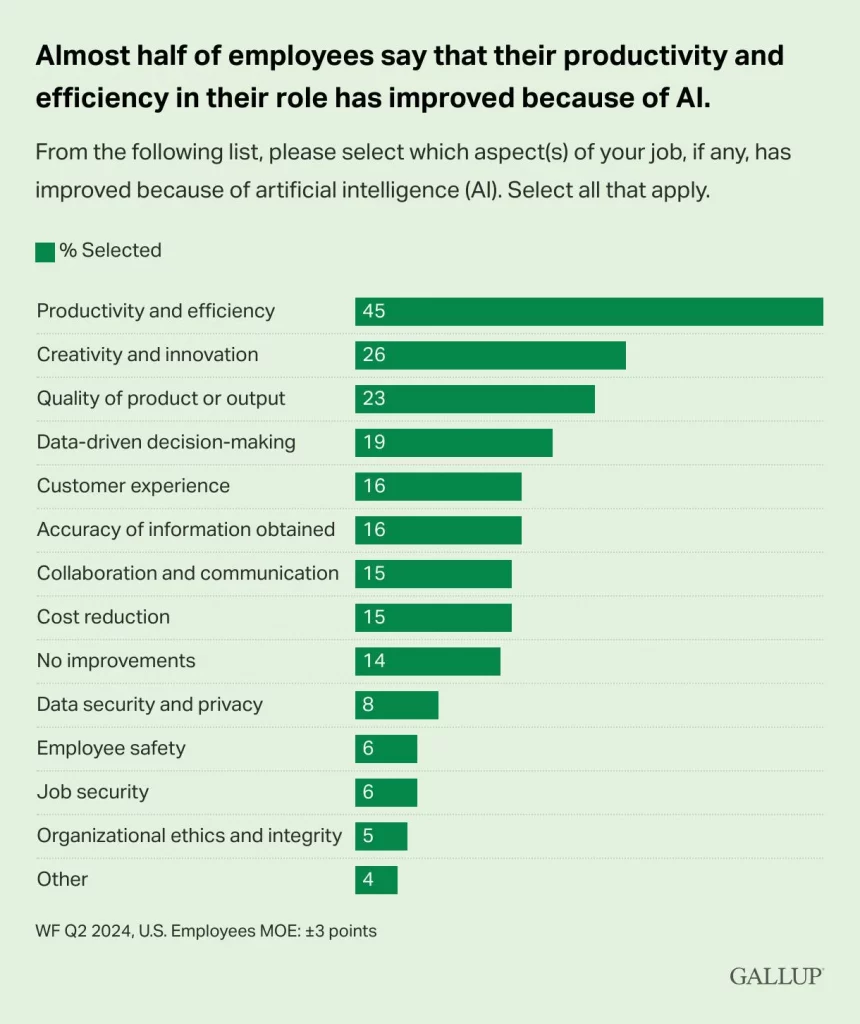
These are really nice benefits for AI. You can get more done, come up with more and better ideas, make better decisions, help your customers, and a lot more.
Yet as this data shows, we're still in the early days. That means that it's one of the BEST ways to stand out for your career.
Whether you want to advance at your current company, or add some awesome bullet points for your resume, having mastered AI and how to teach others to use it is a highly valuable skill.
What do you want to learn about AI?
I want to continue to provide great insights for leaders on AI, but I need to know what YOU want to learn most.
Hit reply and let me know, so we can include it in our research, future posts, and entries here in the Lighthouse Leadership Weekly.
🗣️ Ask Lighthouse on Open Door Policies and Problem Solving
A reader wrote in:
"How can managers balance between being available and helpful, while also putting a certain threshold around how much of the problem you want your team to solve first? And how can I help them learn when to escalate and prioritize problems?"
This is a GREAT set of questions, which I hear variations of often.
Remember: A huge part of your job as a leader is to be a COACH.
And being a coach means:
- You teach your team what you need and want from them. They are not mind readers. Any decent employee will listen to what you need and do their best to meet that...if you tell them clearly.
- You set the rules. Is something mission critical and you want all the updates? Tell them. Is something not important and you trust them, so just let you know when it's completely delivered? Tell them. You make the rules. Just remember you're then responsible for the outcomes based on those rules.
- If they don't know how, it's your job to help them. Except at the highest levels (i.e.- you're an executive, or report directly to a founder or CEO), it's the job of a person's manager to help them grow, learn, and master the skills needed to succeed at the job they have and be ready for the role they could be promoted to.
- Coaching is as much the day-to-day as it is big things. An underrated part of coaching is how you help make little adjustments day by day. These little adjustments are just as important as what it takes for them to go from L4 to L5 or manager to director.
Teach them how to be more coachable.
A big part of those day-to-day things is helping them be more coachable. That means literally laying out for them answers to questions like:
- When should they come to you with a problem? (What's the threshold for a problem to need your attention?)
- What do you want them to have tried first before coming to you? (How can they learn to solve their own problems? What do you want them to prepare before you meet to discuss a problem?)
- Who can they go to for help in some situations in addition to asking you? (Mentors and pairing junior and senior people up are great for this...as is AI!)
When you do this, you make it easier for you to be their coach. You also help them learn to be more independent and resourceful. That's a win-win.
Remember the water line.
We talk about this concept from time to time and it's a great time to revisit it.
When adding nuance to the "when to ask me for help" question, the water line is a great concept to teach your team:
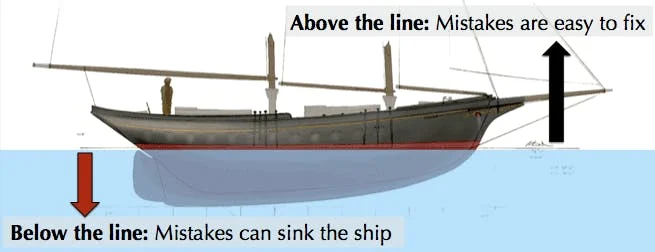
Put simply, mistakes that are above the water line you can easily recover from, so are a great opportunity for your team members to learn from their mistakes and take more chances with less supervision by you. Meanwhile, anything mission critical, or below the water line, your team should involve you right away and much earlier as problems come up.
The last thing you want is a critical problem to fester because your team didn't want to bother you.
Teach them to know when to "bother" you! (...though it shouldn't be called bothering you...it's your job!)
What about coming to me with solutions?
You may have heard the management saying, "don't bring me problems, bring me solutions." And if you want to manage up well, it's definitely a good idea to go to your boss with possible solutions at least partially thought through.
Once again, this is a time when you need to COACH.
You should be coaching your team on how you want them to come to you with solutions:
- Do you want fully thought out solutions and you then help pick the best one?
- Do you want them to have a few mostly thought through options, and then workshop together from there?
- Do you want them to spend most of their time helping thoroughly define the problem, then come up with solutions together?
- Or is there some nuance to this and sometimes you want the first option, and other times the third?
Ultimately, it's up to you to teach them what you prefer. And it's equally important to remember you should praise and reward people who put in the effort to come to you when and how you want them to. That's how you get more of it consistently.
Remember: Being a leader means always looking in the mirror first. And in this case that means always asking, "How can I coach my team to get better outcomes from problems like this?"
❓ Poll of the week
Last week, we asked a different kind of question. It was about understanding how everyone's minds work.
What we found was that the ratio of managers with an inner dialogue vs not (8.3 to 1) is slightly higher than the ratio for ICs (7 to 1).
What's interesting is that the results fall in line with the reported results according to Perplexity: "5-10%: Percentage of individuals without any inner voice."
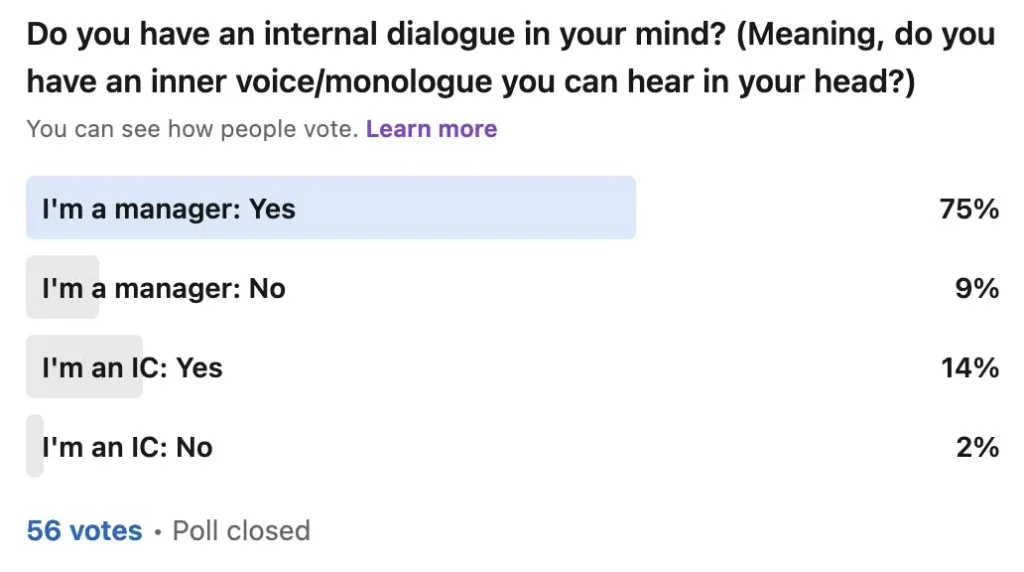
Now, this week, we return to our more typical style of questions with one about your biggest challenge:
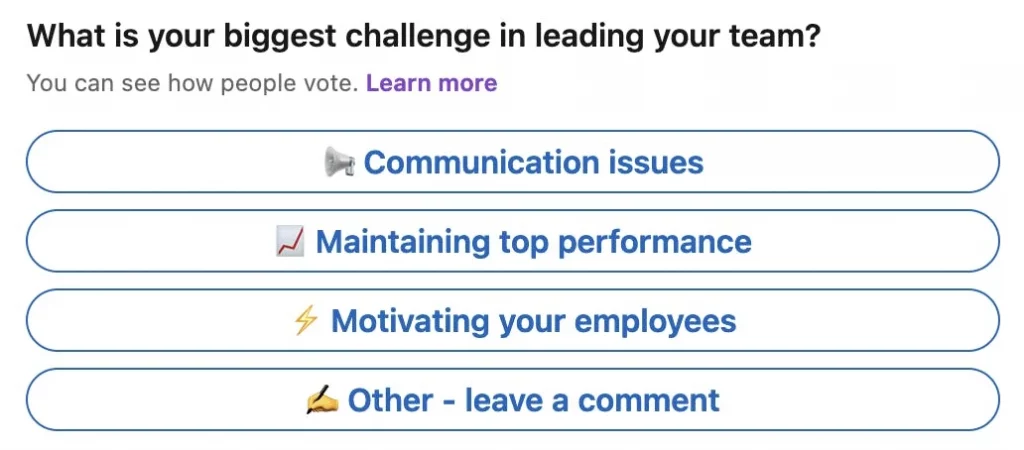
You can tell us what your biggest challenge is by taking the poll on Linkedin
Sign up to get this newsletter & our latest blog posts straight to your inbox:




